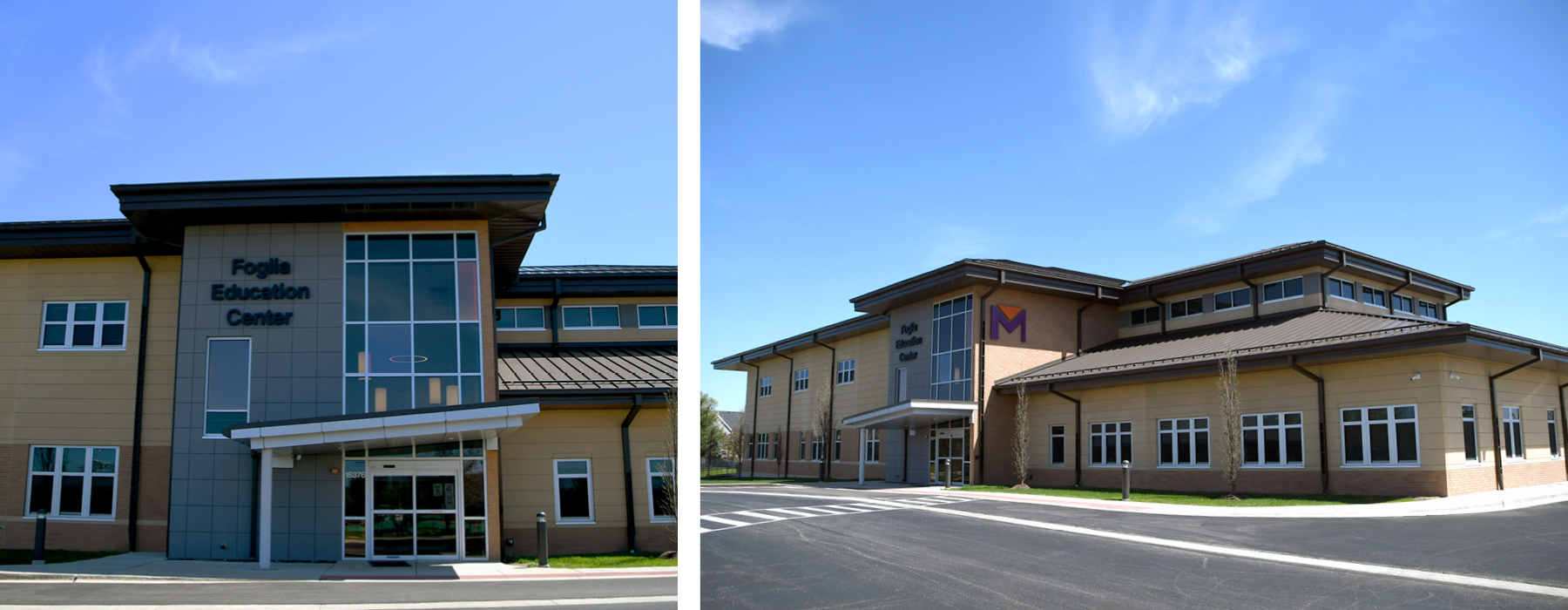Marklund Day School-Geneva, named the Foglia Education Center, is located at 1S450 Wyatt Drive, Geneva, Illinois. The school is on the Marklund Hyde Center campus. This state-of-the-art facility is meets the needs of children with multiple medical needs on Level One, and those with autism spectrum disorders on Level Two. It features intentional design components, upgraded technology, and places to meet, gather and grow!

Marklund Day School provides an environment conducive to learning through specialized curriculum, positive behavioral interventions, and individualized student support.
Marklund’s highly sensory-driven program features physical and occupational therapy, speech and language therapy, art and music therapy, sensory room, computer adapted technology, community opportunities, recreational therapy, and more.
Marklund Day School uses a holistic approach to enhance physical, social, emotional, and intellectual growth. Teachers and therapists learn about students’ individual strengths through assessment, direct observation, and communication with families.
• Provides a highly specialized education experience for students ages 3-21 with mild to severe disabilities, as well as students with behavioral and medical needs.
• Provides a 1:3 student-staff ratio, with 6-10 students per classroom.
• Maintains a focus on each student transitioning to the least-restrictive learning environment.
• Offers an extended school year: Four-hour-a-day summer program allows students to learn year-round.
• Establishes relationships and partnerships throughout community, which provide ongoing opportunities for students to interact with the public and experience new activities.
• Has a dedicated, caring and compassionate staff.
Serving Students ages 3-21 from Early Childhood to Transition
Students with mild to severe disabilities, including:
• Intellectual Disabilities
• Developmental Delay
• Autism
• Traumatic Brain Injury (TBI)
• Multiple Disabilities
• Other Health Impairments
________________________
Students with complex medical needs, including:
• Seizures
• Cerebral Palsy
• Diabetes
• Temperature Regulation Issues
• Muscular Dystrophy
• Acquired Brain Injury (ABI)
• Tracheostomy
________________________
Related Services Provided:
• Nursing Care
• Occupational Therapy
• Physical Therapy
• Speech Therapy
________________________
Program Services Provided:
• Behavior Analyst And Registered Behavior Teachers (BCBA and RBTS)
• Music Therapy
• Recreational Therapy
Bloomingdale, Elgin and Geneva locations
The Life Skills Program at Marklund Day School provides an enriching education experience for students ages 3-21 with autism and other disabilities, as well as behavioral and medical needs.
Marklund achieves this in a variety of ways:
Comprehensive approach: Through a collaborative team of teachers, therapists, BCBA, RBT, Behavior Specialists, parents/guardians, and school district representatives, Marklund focuses on building and developing academic, cognitive, communication, social, gross-motor and fine-motor-skills.
Nursing staff: Marklund Day School can accommodate students with medical needs by integrating highly qualified nursing staff into the program.
Highly structured classrooms: Marklund Day School utilizes methodologies such as – PECS (Picture Exchange Communication System) and ABA (Applied Behavior Analysis) techniques.
Individualized curriculum: Students follow a complete and individualized curriculum tied to Illinois Learning Standards, Common Core Essential Elements and IEP (Individualized Education Plan) goals. Courses offered to our students are aligned to the general education course offerings. Functional life skills and vocational training are integrated into the students’ daily lessons.
Technology: Classrooms use computers equipped with accessible switches and adapted programs; PROwise and SMART technology, iPads with accessible communication apps and modified programing.
Sensory-integrated program: Each classroom incorporates a sensory diet for students including frequent movement breaks on a trampoline and platform swing. Marklund Day School also has Sensory rooms that offer sensory experiences and enhanced learning.
Community outings: As students participate in outings to the park, local stores and community service events, they have the opportunity to apply generalized skills and interact with individuals outside of the school setting.
Three locations: Bloomingdale, Elgin and Geneva campuses
The Multi-Needs Program at Marklund Day School provides an enriching education experience for students ages 3-21 with multiple disabilities.
Marklund achieves this in a variety of ways:
Comprehensive approach: Through a collaborative team of teachers, therapists, parents/guardians, and school district representatives, Marklund focuses on academic, cognitive, communication, gross-motor and fine-motor-skills.
Nursing staff: Marklund Day School can accommodate students with medical needs by integrating highly qualified nursing staff into the program.
Individualized curriculum: Students follow a complete and individualized curriculum tied to Illinois Learning Standards, Common Core Essential Elements, and IEP (Individualized Education Plan) goals. Courses offered to our students are aligned to the general education course offerings. Functional life skills and vocational training are integrated into students’ daily lessons.
Technology: Classrooms use assistive adaptive technology, including iPads and voice-output switches, that is embedded into the instructional days.
Sensory-integrated program: Each classroom provides sensory-integrated programming with a focus on self-regulation to support an engaging learning environment. In addition, tactile strategies and sensory rooms support students with visual and/or hearing impairments, to help learning come alive.
Community outings: As students participate in community outings, they have the opportunity to apply generalized skills and interact with individuals outside of the school setting.
Our Mission…
